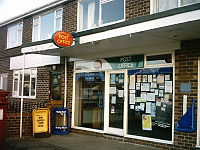- Post Office Ltd
-
For the UK's mail delivery service, see Royal Mail.
Post Office Ltd Type Wholly owned subsidiary Industry postal service Founded 1986 Headquarters 80-86 Old Street, London EC1V 9NN Area served United Kingdom Key people Paula Vennels, Managing Director Parent Royal Mail Group plc Website postoffice.co.uk Post Office Ltd (Welsh: Swyddfa'r Post Cyf.; Scottish Gaelic: Oifis a' Phuist[1]) is a retail post office company in the United Kingdom that provides a wide range of products including postage stamps and banking to the public through its nationwide network of post office branches.
Contents
Structure
Post Office Ltd. was separated from the postal service Royal Mail in 1986 under the name Post Office Counters Ltd., and the name changed to Post Office Ltd. in 2001.[2] Post Office Ltd. remains a wholly owned subsidiary of Royal Mail Group Ltd. A large number of its branches are under franchise agreements.
There are currently around 12,000 Post Office branches across the UK, of which 373 are directly managed by Post Office Ltd. (known as Crown Offices). The majority of other branches are either run by multiple franchise partners or local subpostmaster agents.
Services
 The Post Office in Oxford, UK
The Post Office in Oxford, UK
The Post Office has a wide variety of services throughout the network of branches. Products and services available vary throughout the network; main post offices generally provide the full range of services.
Postal services
The Post Office provides information on services and accepts postal items and payment on behalf of the two collection and delivery divisions of the Royal Mail group, Royal Mail and Parcelforce. These include a variety of ordinary and guaranteed services both for delivery within the United Kingdom and to international destinations. Postage stamps (including commemorative stamps and other philatelic items), airletters and international reply coupons are sold, while applications for redirection of mail are accepted on behalf of Royal Mail.
Post Office Local Collect is a scheme whereby undelivered mail can be redirected at customer request to a post office for convenient collection. Poste restante mail can also be held for collection by people travelling.
Banking services
Personal banking services are offered on behalf of a number of "partner banks" that the Post Office has agreements with. Although different services are available on behalf of different institutions, these may include cash withdrawals, paying in cash and cheques, balance enquiries and cheque encashment. Some post offices also have cash machines, mainly provided by Bank of Ireland.
The Post Office Card Account is a basic bank account allowing customers to collect benefit payments. Most other basic accounts can also be accessed through post offices. The Card Account cannot be accessed anywhere other than a Post Office Counter or ATM at a Post Office. These accounts are limited to Department of Work & Pensions deposits of benefit payments and HMTC Tax Credits/Child Benefit. Housing Benefit from the local Council for example, must be paid elsewhere. If the account remains dormant for one year, it is closed. These bank accounts are run by J.P. Morgan Europe Ltd on behalf of the Post Office. To open an account, you must be in receipt of benefits and a referral is made via the Jobcentre Plus.
Business banking services are also offered, mainly through Alliance & Leicester Commercial Bank (the successor to the Post Office Girobank).
Savings products
The Post Office has long been an agent for National Savings and Investments, which was originally the Post Office Savings Bank but is now a wholly separate institution. Information is available for most NS&I products, including Premium Bonds, and numerous transactions can be carried out in post offices.
In recent years the Post Office has launched its own range of branded savings products, which are sometimes in competition with those offered by NS&I. The most recently introduced, in September 2008, is a Post Office ISA.[3] Also on offer is an instant access account (Instant Saver), while issues of two fixed term investments (Five Year Saver and Growth Bond) are periodically available. The Post Office are also a provider for the Child Trust Fund.
Telephony
The Post Office operates as a provider of a home landline telephone service (branded as Post Office HomePhone) and has recently added broadband internet to its portfolio.
Mobile phone E Top-up is available on behalf of most networks. Post Office branded prepay phonecards are available, offering potential savings particularly on international call rates.
Insurance and financial services
The Post Office is now seeking to establish itself as a financial service provider and provides a number of branded insurance products including for cars, vans and motorbikes; home insurance (buildings and/or contents); pet insurance and travel insurance. Life insurance, over 50s life cover and lifestyle protection insurance are also available.
The Post Office is now offering itself as a mortgage lender and also offers personal loans, although the latter are now marketed purely through the company's website and not through the branch network.
Bill payments
A number of bill payments can be accepted on behalf of a variety of organisations including utilities, local authorities and others. These can be in the form of automated payments (barcoded bills, swipe cards, key charging) or manual transactions through the Alliance & Leicester Transcash system.[4] The name Transcash was formerly used by Girobank. The Transcash service is not advertised and a search for "Transcash" on the Post Office website returns no results. However, Transcash forms (still marked "Girobank") were still available at Post Office counters in October 2010.
Government services
Check and send services are available for applications made to several government institutions, including the IPS (for British passport applications), DVLA (for driving licences and the Department of Health (for the European Health Insurance Card). Fishing licences are issued on behalf of the Environment Agency from branches in England and Wales. Selected branches issue international driving permits.
Post Office Saving Stamps
Post Office savings stamps were first introduced by Henry Fawcett in the 1880s but was phased out in the 1960s. These were re-introduced in August 2004 because of consumer demand. In 2010 saving stamps were withdrawn and replaced by the Budget Card. In 2011 it was announced that Post Office saving stamps would have to be redeemed by 28th February 2011, although any customers who miss the deadline can post their saving stamps to a central Post Office location where the stamps will be validated. A payout letter will be sent to the customer that can be exchanged for cash at their local branch (ID required).
Other services
- National Lottery games and scratchcards
- Sale and encashment of postal orders
- Foreign currency exchange and Travel Money Card
- Sales of gift vouchers redeemable at certain high street merchants
- Postpak
- Fast drop
In towns, Post Offices are usually open from around 09:00 to 17:30 from Monday to Friday and from 09:00 to 12:30 on Saturday. In some country areas, opening hours are much shorter - perhaps only four hours per week[citation needed]. In some villages an outreach service is provided, this can be in a van, village hall, village shop etc. Most Post Offices are shut on Sundays and Bank Holidays.
Concerns
Post Office Ltd. has in recent years announced losses; a reported £102 million in 2006. This has raised many concerns in the media regarding The Post Office's ability as a company to operate efficiently.[5] Plans to cut the £150m-a-year subsidy for rural post offices led to the announcement that 2500 local Post Offices were to be closed. This announcement resulted in a backlash from local communities that rely on the service.
Restructuring
In 2007, The government gave a £1.7 billion subsidy to Royal Mail Group so that it could turn a profit by 2011. This was to be used to invest across the whole network, which is made up of Royal Mail, Post Office Ltd and Parcelforce.
85 Crown Post Offices were closed, 70 of which were sold to W H Smith. This followed a trial of six Post Office Outlets in W H Smith stores. W H Smith was expected to make up to £2.5 million extra in annual profit.
2,500 sub-Post Offices closed between 2008-09. Redundancy packages were provided from public funding, (subpostmasters were paid over 20 months salary, roughly £65,000 each).[6]
Under the Postal Services Act 2011, post offices may be sold off to become mutuals.
Post Offices not open to the public
Six post office branches are not open to the public:[7]
- Court (Buckingham Palace)
- House of Commons
- Portcullis House
- Royal Automobile Club, 89 Pall Mall, London
- The Scottish Parliament
- Windsor Castle
Notes and references
- ^ Spadaro, Katherine M.; Graham, Katie (2001). Colloquial Scottish Gaelic: the complete course for beginners. London: Routhledge. pp. 284. ISBN 0-415-20675-8. http://books.google.com/books?id=FgkPHTd6BIIC&pg=PA284.
- ^ WebCheck entry for "Post Office"
- ^ Hazell, Tony (2008-09-03). "Sweetener boosts Post Office Isa". thisismoney.co.uk. Daily Mail Group. http://www.thisismoney.co.uk/saving-and-banking/article.html?in_article_id=451536&in_page_id=7. Retrieved 2008-09-03.
- ^ http://www.copy-house.co.uk/downloads/pdf/al_billpaybrochure.pdf
- ^ [1], The Times article analysing Post Office losses.
- ^ http://www.publications.parliament.uk/pa/cm200607/cmselect/cmtrdind/593/593.pdf
- ^ http://www.whatdotheyknow.com/request/380/response/21431/attach/2/Office%20List%20210309.xls
Further reading
External links
- Post Office official website
- Royal Mail official website
- Postwatch - the watchdog for postal services
Postal services in the United Kingdom Postcodes and other postal units Organisations and philately Royal Mail · Post Office · British Forces Post Office · Parcelforce · Postage stamps and postal history
Categories:- Royal Mail
- Retail companies of the United Kingdom
- Postal system of the United Kingdom
- Retail companies established in 1986
- 1986 establishments in the United Kingdom
Wikimedia Foundation. 2010.




